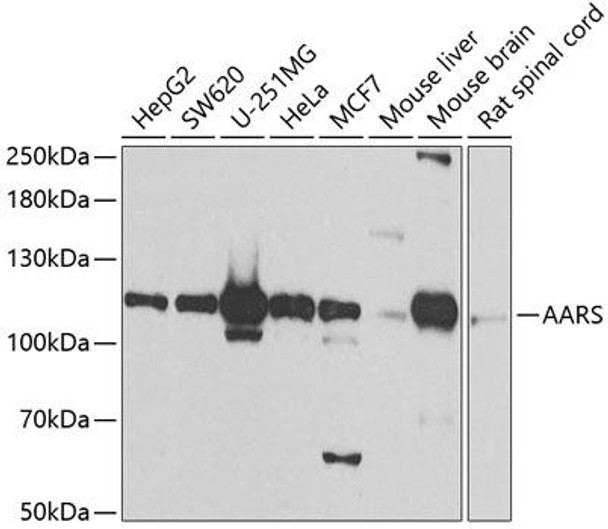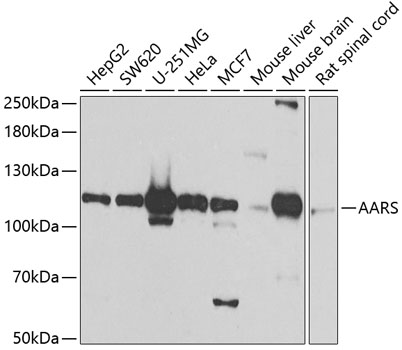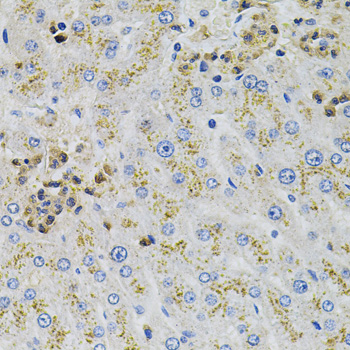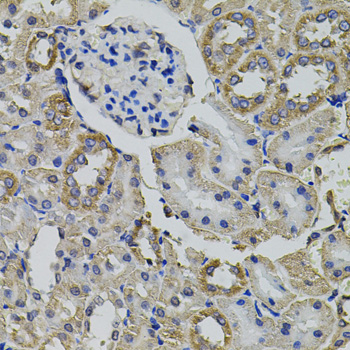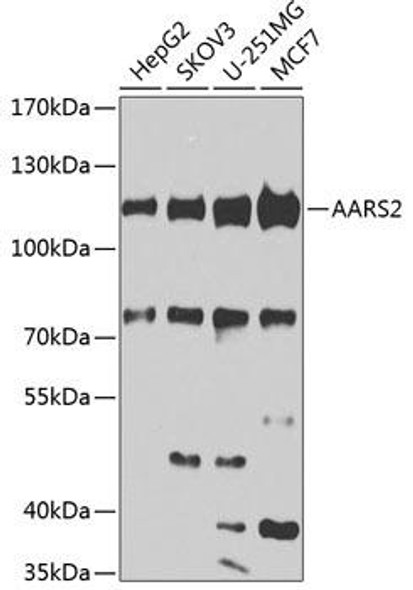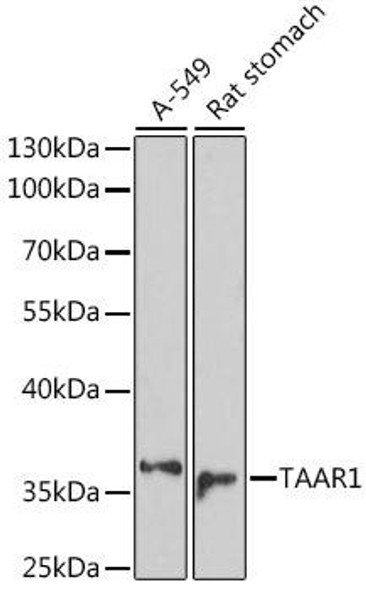Anti-AARS Antibody (CAB7864)
- SKU:
- CAB7864
- Product type:
- Antibody
- Reactivity:
- Human
- Mouse
- Rat
- Host Species:
- Rabbit
- Isotype:
- IgG
- Antibody Type:
- Polyclonal Antibody
- Research Area:
- Metabolism
Frequently bought together:
Description
| Antibody Name: | Anti-AARS Antibody |
| Antibody SKU: | CAB7864 |
| Antibody Size: | 20uL, 50uL, 100uL |
| Application: | WB IHC |
| Reactivity: | Human, Mouse, Rat |
| Host Species: | Rabbit |
| Immunogen: | A synthetic peptide of human AARS |
| Application: | WB IHC |
| Recommended Dilution: | WB 1:500 - 1:2000 IHC 1:50 - 1:100 |
| Reactivity: | Human, Mouse, Rat |
| Positive Samples: | HepG2, SW620, U-251MG, HeLa, MCF7, Mouse liver, Mouse brain, Rat spinal cord |
| Immunogen: | A synthetic peptide of human AARS |
| Purification Method: | Affinity purification |
| Storage Buffer: | Store at -20°C. Avoid freeze / thaw cycles. Buffer: PBS with 0.02% sodium azide, 50% glycerol, pH7.3. |
| Isotype: | IgG |
| Sequence: | Email for sequence |
| Gene ID: | 16 |
| Uniprot: | P49588 |
| Cellular Location: | Cytoplasm |
| Calculated MW: | 106kDa/109kDa |
| Observed MW: | 107kDa |
| Synonyms: | AARS, CMT2N, EIEE29 |
| Background: | The human alanyl-tRNA synthetase (AARS) belongs to a family of tRNA synthases, of the class II enzymes. Class II tRNA synthases evolved early in evolution and are highly conserved. This is reflected by the fact that 498 of the 968-residue polypeptide human AARS shares 41% identity witht the E.coli protein. tRNA synthases are the enzymes that interpret the RNA code and attach specific aminoacids to the tRNAs that contain the cognate trinucleotide anticodons. They consist of a catalytic domain which interacts with the amino acid acceptor-T psi C helix of the tRNA, and a second domain which interacts with the rest of the tRNA structure. |
| UniProt Protein Function: | AARS: Catalyzes the attachment of alanine to tRNA(Ala) in a two-step reaction: alanine is first activated by ATP to form Ala- AMP and then transferred to the acceptor end of tRNA(Ala). Also edits incorrectly charged tRNA(Ala) via its editing domain. Defects in AARS are the cause of Charcot-Marie-Tooth disease type 2N (CMT2N). It is an axonal form of Charcot-Marie-Tooth disease, a disorder of the peripheral nervous system, characterized by progressive weakness and atrophy, initially of the peroneal muscles and later of the distal muscles of the arms. Charcot-Marie-Tooth disease is classified in two main groups on the basis of electrophysiologic properties and histopathology: primary peripheral demyelinating neuropathies(designated CMT1 when they are dominantly inherited) and primary peripheral axonal neuropathies (CMT2). Neuropathies of the CMT2 group are characterized by signs of axonal regeneration in the absence of obvious myelin alterations, normal or slightly reduced nerve conduction velocities, and progressive distal muscle weakness and atrophy. Nerve conduction velocities are normal or slightly reduced. Belongs to the class-II aminoacyl-tRNA synthetase family. |
| UniProt Protein Details: | Protein type:Aminoacyl-tRNA synthetase; EC 6.1.1.7; Ligase; RNA-binding; Translation; Translation regulation Chromosomal Location of Human Ortholog: 16q22.1 Cellular Component: cytoplasm; cytosol; membrane; mitochondrion Molecular Function:alanine-tRNA ligase activity; amino acid binding; tRNA binding Biological Process: alanyl-tRNA aminoacylation; tRNA aminoacylation for protein translation; tRNA modification; tRNA processing Disease: Charcot-marie-tooth Disease, Axonal, Type 2n; Epileptic Encephalopathy, Early Infantile, 29 |
| NCBI Summary: | The human alanyl-tRNA synthetase (AARS) belongs to a family of tRNA synthases, of the class II enzymes. Class II tRNA synthases evolved early in evolution and are highly conserved. This is reflected by the fact that 498 of the 968-residue polypeptide human AARS shares 41% identity witht the E.coli protein. tRNA synthases are the enzymes that interpret the RNA code and attach specific aminoacids to the tRNAs that contain the cognate trinucleotide anticodons. They consist of a catalytic domain which interacts with the amino acid acceptor-T psi C helix of the tRNA, and a second domain which interacts with the rest of the tRNA structure. [provided by RefSeq, Jul 2008] |
| UniProt Code: | P49588 |
| NCBI GenInfo Identifier: | 115502460 |
| NCBI Gene ID: | 16 |
| NCBI Accession: | P49588.2 |
| UniProt Secondary Accession: | P49588,Q53GV7, Q96FA0, A6NF14, B4DR45, |
| UniProt Related Accession: | P49588 |
| Molecular Weight: | 107kDa |
| NCBI Full Name: | Alanine--tRNA ligase, cytoplasmic |
| NCBI Synonym Full Names: | alanyl-tRNA synthetase |
| NCBI Official Symbol: | AARS |
| NCBI Official Synonym Symbols: | CMT2N; EIEE29 |
| NCBI Protein Information: | alanine--tRNA ligase, cytoplasmic |
| UniProt Protein Name: | Alanine--tRNA ligase, cytoplasmic |
| UniProt Synonym Protein Names: | Alanyl-tRNA synthetase |
| UniProt Gene Name: | AARS |

